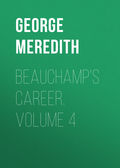
George Meredith
Rhoda Fleming. Complete
Robert burst into a glorious laugh.
“Why, mother! Mrs. Boulby! haven’t you got a word for me?”
“My blessedest Robert!” the good woman cried, as she rushed up to kiss him. “Though it wasn’t to see you I came exactly.” She whispered: “The Major and the good gentleman—they’re behind. I travelled down with them. Dear,—you’d like to know:—Mrs. Lovell sent her little cunning groom down to Warbeach just two weeks back to make inquiries about that villain; and the groom left me her address, in case, my dear, when the poor creature—his true wife—crawled home, and we knew of her at Three-Tree Farm and knew her story. I wrote word at once, I did, to Mrs. Lovell, and the sweet good lady sent down her groom to fetch me to you to make things clear here. You shall understand them soon. It’s Providence at work. I do believe that now there’s a chance o’ punishing the wicked ones.”
The figure of Rhoda with two lights in her hand was seen in the porch, and by the shadowy rays she beheld old Anthony leaning against the house, and Major Waring with a gentleman beside him close upon the gate.
At the same time a sound of wheels was heard.
Robert rushed back into the great parlour-kitchen, and finding it empty, stamped with vexation. His prey had escaped.
But there was no relapse to give spare thoughts to that pollution of the house. It had passed. Major Waring was talking earnestly to Mr. Fleming, who held his head low, stupefied, and aware only of the fact that it was a gentleman imparting to him strange matters. By degrees all were beneath the farmer’s roof—all, save one, who stood with bowed head by the threshold.
There is a sort of hero, and a sort of villain, to this story: they are but instruments. Hero and villain are combined in the person of Edward, who was now here to abase himself before the old man and the family he had injured, and to kneel penitently at the feet of the woman who had just reason to spurn him. He had sold her as a slave is sold; he had seen her plunged into the blackest pit; yet was she miraculously kept pure for him, and if she could give him her pardon, might still be his. The grief for which he could ask no compassion had at least purified him to meet her embrace. The great agony he had passed through of late had killed his meaner pride. He stood there ready to come forward and ask forgiveness from unfriendly faces, and beg that he might be in Dahlia’s eyes once—that he might see her once.
He had grown to love her with the fullest force of a selfish, though not a common, nature. Or rather he had always loved her, and much of the selfishness had fallen away from his love. It was not the highest form of love, but the love was his highest development. He had heard that Dahlia, lost to him, was free. Something like the mortal yearning to look upon the dead risen to life, made it impossible for him to remain absent and in doubt. He was ready to submit to every humiliation that he might see the rescued features; he was willing to pay all his penalties. Believing, too, that he was forgiven, he knew that Dahlia’s heart would throb for him to be near her, and he had come.
The miraculous agencies which had brought him and Major Waring and Mrs. Boulby to the farm, that exalted woman was relating to Mrs. Sumfit in another part of the house.
The farmer, and Percy, and Robert were in the family sitting-room, when, after an interval, William Fleming said aloud, “Come in, sir,” and Edward stepped in among them.
Rhoda was above, seeking admittance to her sisters door, and she heard her father utter that welcome. It froze her limbs, for still she hated the evil-doer. Her hatred of him was a passion. She crouched over the stairs, listening to a low and long-toned voice monotonously telling what seemed to be one sole thing over and over, without variation, in the room where the men were. Words were indistinguishable. Thrice, after calling to Dahlia and getting no response, she listened again, and awe took her soul at last, for, abhorred as he was by her, his power was felt: she comprehended something of that earnestness which made the offender speak of his wrongful deeds, and his shame, and his remorse, before his fellow-men, straight out and calmly, like one who has been plunged up to the middle in the fires of the abyss, and is thereafter insensible to meaner pains. The voice ended. She was then aware that it had put a charm upon her ears. The other voices following it sounded dull.
“Has he—can he have confessed in words all his wicked baseness?” she thought, and in her soul the magnitude of his crime threw a gleam of splendour on his courage, even at the bare thought that he might have done this. Feeling that Dahlia was saved, and thenceforth at liberty to despise him and torture him, Rhoda the more readily acknowledged that it might be a true love for her sister animating him. From the height of a possible vengeance it was perceptible.
She turned to her sister’s door and knocked at it, calling to her, “Safe, safe!” but there came no answer; and she was half glad, for she had a fear that in the quick revulsion of her sister’s feelings, mere earthly love would act like heavenly charity, and Edward would find himself forgiven only too instantly and heartily.
In the small musk-scented guest’s parlour, Mrs. Boulby was giving Mrs. Sumfit and poor old sleepy Anthony the account of the miraculous discovery of Sedgett’s wickedness, which had vindicated all one hoped for from Above; as also the narration of the stabbing of her boy, and the heroism and great-heartedness of Robert. Rhoda listened to her for a space, and went to her sister’s door again; but when she stood outside the kitchen she found all voices silent within.
It was, in truth, not only very difficult for William Fleming to change his view of the complexion of circumstances as rapidly as circumstances themselves changed, but it was very bitter for him to look upon Edward, and to see him in the place of Sedgett.
He had been struck dumb by the sudden revolution of affairs in his house; and he had been deferentially convinced by Major Waring’s tone that he ought rightly to give his hearing to an unknown young gentleman against whom anger was due. He had listened to Edward without one particle of comprehension, except of the fact that his behaviour was extraordinary. He understood that every admission made by Edward with such grave and strange directness, would justly have condemned him to punishment which the culprit’s odd, and upright, and even-toned self-denunciation rendered it impossible to think of inflicting. He knew likewise that a whole history was being narrated to him, and that, although the other two listeners manifestly did not approve it, they expected him to show some tolerance to the speaker.
He said once, “Robert, do me the favour to look about outside for t’ other.” Robert answered him, that the man was far away by this time.
The farmer suggested that he might be waiting to say his word presently.
“Don’t you know you’ve been dealing with a villain, sir?” cried Robert. “Throw ever so little light upon one of that breed, and they skulk in a hurry. Mr. Fleming, for the sake of your honour, don’t mention him again. What you’re asked to do now, is to bury the thoughts of him.”
“He righted my daughter when there was shame on her,” the farmer replied.
That was the idea printed simply on his understanding.
For Edward to hear it was worse than a scourging with rods. He bore it, telling the last vitality of his pride to sleep, and comforting himself with the drowsy sensuous expectation that he was soon to press the hand of his lost one, his beloved, who was in the house, breathing the same air with him; was perhaps in the room above, perhaps sitting impatiently with clasped fingers, waiting for the signal to unlock them and fling them open. He could imagine the damp touch of very expectant fingers; the dying look of life-drinking eyes; and, oh! the helplessness of her limbs as she sat buoying a heart drowned in bliss.
It was unknown to him that the peril of her uttermost misery had been so imminent, and the picture conjured of her in his mind was that of a gentle but troubled face—a soul afflicted, yet hoping because it had been told to hope, and half conscious that a rescue, almost divine in its suddenness and unexpectedness, and its perfect clearing away of all shadows, approached.
Manifestly, by the pallid cast of his visage, he had tasted shrewd and wasting grief of late. Robert’s heart melted as he beheld the change in Edward.
“I believe, Mr. Blancove, I’m a little to blame,” he said. “Perhaps when I behaved so badly down at Fairly, you may have thought she sent me, and it set your heart against her for a time. I can just understand how it might.”
Edward thought for a moment, and conscientiously accepted the suggestion; for, standing under that roof, with her whom he loved near him, it was absolutely out of his power for him to comprehend that his wish to break from Dahlia, and the measures he had taken or consented to, had sprung from his own unassisted temporary baseness.
Then Robert spoke to the farmer.
Rhoda could hear Robert’s words. Her fear was that Dahlia might hear them too, his pleading for Edward was so hearty. “Yet why should I always think differently from Robert?” she asked herself, and with that excuse for changeing, partially thawed.
She was very anxious for her father’s reply; and it was late in coming. She felt that he was unconvinced. But suddenly the door opened, and the farmer called into the darkness,—
“Dahlia down here!”
Previously emotionless, an emotion was started in Rhoda’s bosom by the command, and it was gladness. She ran up and knocked, and found herself crying out: “He is here—Edward.”
But there came no answer.
“Edward is here. Come, come and see him.”
Still not one faint reply.
“Dahlia! Dahlia!”
The call of Dahlia’s name seemed to travel endlessly on. Rhoda knelt, and putting her mouth to the door, said,—
“My darling, I know you will reply to me. I know you do not doubt me now. Listen. You are to come down to happiness.”
The silence grew heavier; and now a doubt came shrieking through her soul.
“Father!” rang her outcry.
The father came; and then the lover came, and neither to father nor to lover was there any word from Dahlia’s voice.
She was found by the side of the bed, inanimate, and pale as a sister of death.
But you who may have cared for her through her many tribulations, have no fear for this gentle heart. It was near the worst; yet not the worst.
CHAPTER XLVII
Up to the black gates, but not beyond them. The dawn following such a night will seem more like a daughter of the night than promise of day. It is day that follows, notwithstanding: The sad fair girl survived, and her flickering life was the sole light of the household; at times burying its members in dusk, to shine on them again more like a prolonged farewell than a gladsome restoration.
She was saved by what we call chance; for it had not been in her design to save herself. The hand was firm to help her to the deadly draught. As far as could be conjectured, she had drunk it between hurried readings from her mother’s Bible; the one true companion to which she had often clung, always half-availingly. The Bible was found by her side, as if it had fallen from the chair before which she knelt to read her last quickening verses, and had fallen with her. One arm was about it; one grasped the broken phial with its hideous label.
It was uncomplainingly registered among the few facts very distinctly legible in Master Gammon’s memory, that for three entire weeks he had no dumplings for dinner at the farm; and although, upon a computation, articles of that description, amounting probably to sixty-three (if there is any need for our being precise), were due to him, and would necessarily be for evermore due to him, seeing that it is beyond all human and even spiritual agency to make good unto man the dinner he has lost, Master Gammon uttered no word to show that he was sensible of a slight, which was the only indication given by him of his knowledge of a calamity having changed the order of things at the farm. On the day when dumplings reappeared, he remarked, with a glance at the ceiling: “Goin’ on better—eh, marm?”
“Oh! Mas’ Gammon,” Mrs. Sumfit burst out; “if I was only certain you said your prayers faithful every night!” The observation was apparently taken by Master Gammon to express one of the mere emotions within her bosom, for he did not reply to it.
She watched him feeding in his steady way, with the patient bent back, and slowly chopping old grey jaws, and struck by a pathos in the sight, exclaimed,—
“We’ve all been searched so, Mas’ Gammon! I feel I know everything that’s in me. I’d say, I couldn’t ha’ given you dumplin’s and tears; but think of our wickedness, when I confess to you I did feel spiteful at you to think that you were wiltin’ to eat the dumplin’s while all of us mourned and rocked as in a quake, expecting the worst to befall; and that made me refuse them to you. It was cruel of me, and well may you shake your head. If I was only sure you said your prayers!”
The meaning in her aroused heart was, that if she could be sure Master Gammon said his prayers, so as to be searched all through by them, as she was herself, and to feel thereby, as she did, that he knew everything that was within him, she would then, in admiration of his profound equanimity, acknowledge him to be a superior Christian.
Naturally enough, Master Gammon allowed the interjection to pass, regarding it as simply a vagrant action of the engine of speech; while Mrs. Sumfit, with an interjector’s consciousness of prodigious things implied which were not in any degree comprehended, left his presence in kindness, and with a shade less of the sense that he was a superior Christian.
Nevertheless, the sight of Master Gammon was like a comforting medicine to all who were in the house. He was Mrs. Sumfit’s clock; he was balm and blessedness in Rhoda’s eyes; Anthony was jealous of him; the farmer held to him as to a stake in the ground: even Robert, who rallied and tormented, and was vexed by him, admitted that he stood some way between an example and a warning, and was a study. The grand primaeval quality of unchangeableness, as exhibited by this old man, affected them singularly in their recovery from the storm and the wreck of the hours gone by; so much so that they could not divest themselves of the idea that it was a manifestation of power in Master Gammon to show forth undisturbed while they were feeling their life shaken in them to the depths. I have never had the opportunity of examining the idol-worshipping mind of a savage; but it seems possible that the immutability of aspect of his little wooden God may sometimes touch him with a similar astounded awe;—even when, and indeed especially after, he has thrashed it. Had the old man betrayed his mortality in a sign of curiosity to know why the hubbub of trouble had arisen, and who was to blame, and what was the story, the effect on them would have been diminished. He really seemed granite among the turbulent waves. “Give me Gammon’s life!” was Farmer Fleming’s prayerful interjection; seeing him come and go, sit at his meals, and sleep and wake in season, all through those tragic hours of suspense, without a question to anybody. Once or twice, when his eye fell upon the doctor, Master Gammon appeared to meditate. He observed that the doctor had never been called in to one of his family, and it was evident that he did not understand the complication of things which rendered the doctor’s visit necessary.
“You’ll never live so long as that old man,” the farmer said to Robert.
“No; but when he goes, all of him’s gone,” Robert answered.
“But Gammon’s got the wisdom to keep himself safe, Robert; there’s no one to blame for his wrinkles.”
“Gammon’s a sheepskin old Time writes his nothings on,” said Robert. “He’s safe—safe enough. An old hulk doesn’t very easily manage to founder in the mud, and Gammon’s been lying on the mud all his life.”
“Let that be how ‘t will,” returned the farmer; “I’ve had days o’ mortal envy of that old man.”
“Well, it’s whether you prefer being the fiddle or the fiddle-case,” quoth Robert.
Of Anthony the farmer no longer had any envy. In him, though he was as passive as Master Gammon, the farmer beheld merely a stupefied old man, and not a steady machine. He knew that some queer misfortune had befallen Anthony.
“He’ll find I’m brotherly,” said Mr. Fleming; but Anthony had darkened his golden horizon for him, and was no longer an attractive object to his vision.
Upon an Autumn afternoon; Dahlia, looking like a pale Spring flower, came down among them. She told her sister that it was her wish to see Edward. Rhoda had lost all power of will, even if she had desired to keep them asunder. She mentioned Dahlia’s wish to her father, who at once went for his hat, and said: “Dress yourself neat, my lass.” She knew what was meant by that remark. Messages daily had been coming down from the Hall, but the rule of a discerning lady was then established there, and Rhoda had been spared a visit from either Edward or Algernon, though she knew them to be at hand. During Dahlia’s convalescence, the farmer had not spoken to Rhoda of her engagement to the young squire. The great misery intervening, seemed in her mind to have cancelled all earthly engagements; and when he said that she must use care in her attire he suddenly revived a dread within her bosom, as if he had plucked her to the verge of a chasm.
But Mrs. Lovell’s delicacy was still manifest: Edward came alone, and he and Dahlia were left apart.
There was no need to ask for pardon from those gentle eyes. They joined hands. She was wasted and very weak, but she did not tremble. Passion was extinguished. He refrained from speaking of their union, feeling sure that they were united. It required that he should see her to know fully the sinner he had been. Wasted though she was, he was ready to make her his own, if only for the sake of making amends to this dear fair soul, whose picture of Saint was impressed on him, first as a response to the world wondering at his sacrifice of himself, and next, by degrees, as an absolute visible fleshly fact. She had come out of her martyrdom stamped with the heavenly sign-mark.
“Those are the old trees I used to speak of,” she said, pointing to the two pines in the miller’s grounds. “They always look like Adam and Eve turning away.”
“They do not make you unhappy to see them, Dahlia?”
“I hope to see them till I am gone.”
Edward pressed her fingers. He thought that warmer hopes would soon flow into her.
“The neighbours are kind?” he asked.
“Very kind. They, inquire after me daily.”
His cheeks reddened; he had spoken at random, and he wondered that Dahlia should feel it pleasurable to be inquired after, she who was so sensitive.
“The clergyman sits with me every day, and knows my heart,” she added.
“The clergyman is a comfort to women,” said Edward.
Dahlia looked at him gently. The round of her thin eyelids dwelt on him. She wished. She dared not speak her wish to one whose remembered mastery in words forbade her poor speechlessness. But God would hear her prayers for him.
Edward begged that he might come to her often, and she said,—
“Come.”
He misinterpreted the readiness of the invitation.
When he had left her, he reflected on the absence of all endearing epithets in her speech, and missed them. Having himself suffered, he required them. For what had she wrestled so sharply with death, if not to fall upon his bosom and be his in a great outpouring of gladness? In fact he craved the immediate reward for his public acknowledgement of his misdeeds. He walked in this neighbourhood known by what he had done, and his desire was to take his wife away, never more to be seen there. Following so deep a darkness, he wanted at least a cheerful dawn: not one of a penitential grey—not a hooded dawn, as if the paths of life were to be under cloistral arches. And he wanted a rose of womanhood in his hand like that he had parted with, and to recover which he had endured every earthly mortification, even to absolute abasement. The frail bent lily seemed a stranger to him.
Can a man go farther than his nature? Never, when he takes passion on board. By other means his nature may be enlarged and nerved, but passion will find his weakness, and, while urging him on, will constantly betray him at that point. Edward had three interviews with Dahlia; he wrote to her as many times. There was but one answer for him; and when he ceased to charge her with unforgivingness, he came to the strange conclusion that beyond our calling of a woman a Saint for rhetorical purposes, and esteeming her as one for pictorial, it is indeed possible, as he had slightly discerned in this woman’s presence, both to think her saintly and to have the sentiments inspired by the overearthly in her person. Her voice, her simple words of writing, her gentle resolve, all issuing of a capacity to suffer evil, and pardon it, conveyed that character to a mind not soft for receiving such impressions.






